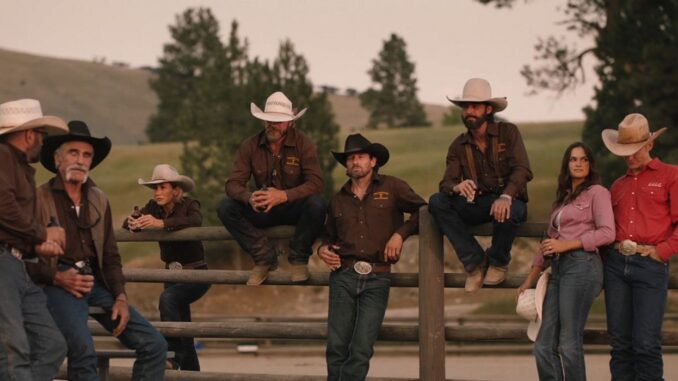
The Unseen Horizon: Why Kevin Costner Rode Away From Yellowstone
The dust-up around Kevin Costner's departure from Yellowstone felt, to many fans, like a betrayal, a sudden gunshot in the otherwise meticulously crafted, sun-drenched drama of the Dutton ranch. For years, Costner, as the unyielding patriarch John Dutton, had been the very bedrock of the show, his stoic gaze and gravelly pronouncements anchoring a sprawling saga of land, legacy, and violence. The public narrative initially swirled with whispers of scheduling conflicts, financial disputes, and creative disagreements—the usual suspects in Hollywood breakups. But for an actor of Costner's singular stature, with a career defined by deliberate choices and a fiercely independent spirit, the "real reason" for leaving wasn't merely a matter of logistics or lucre. It was, in essence, a clash of two very different horizons.
To understand Costner’s true motivation, one must first appreciate the man himself, not just the actor. Costner is not merely a performer; he is an auteur, a visionary with a deep-seated reverence for American history and the vast, unyielding landscapes of the West. His directorial triumphs, Dances With Wolves and Open Range, are not just films; they are testaments to a personal artistic philosophy that prizes authenticity, scale, and a sense of timeless grandeur. He is a storyteller who prefers to hold the reins, not merely be a passenger.
Yellowstone, for all its monumental success, was fundamentally Taylor Sheridan’s vision. Sheridan, a formidable creative force in his own right, is known for his prolific output and his singular control over his cinematic universe. Costner, as brilliant as he was as John Dutton, was ultimately a cog—albeit a magnificent, indispensable one—in another man's sprawling machine. For years, this arrangement worked. Costner lent his gravitas, his iconic Western sensibility, and his star power, helping to elevate Yellowstone into a cultural phenomenon. He was the anchor of the ranch, both on screen and metaphorically.
Yet, beneath the surface of this seemingly harmonious partnership, lay a quiet, relentless yearning for his own narrative. This yearning found its epic form in Horizon: An American Saga, a four-part cinematic behemoth that Costner had been nurturing for decades. This wasn't just another project; it was the Everest of his career, a story he poured his own money into, a saga of manifest destiny and personal sacrifice that resonated with his deepest artistic convictions. He wasn't just acting in Horizon; he was directing, producing, co-writing, and starring. He was, once again, the lone rider on his own trail, guiding every detail, shaping every vista.
This is where the "real reason" for leaving Yellowstone truly emerged: the irreconcilable pull between two masters, two deeply personal ambitions, and a finite amount of time. For Costner, Yellowstone became a demanding lover, jealous of his attention, requiring long stretches away from his family and, crucially, away from the nascent creation of Horizon. The famed scheduling conflicts weren't merely logistical hurdles; they were existential choices. Each day on the Yellowstone set was a day not spent bringing Horizon to life. Each line memorized for John Dutton was a line not written or rehearsed for his own sweeping vision.
As the sands of the hourglass for his prime filmmaking years became increasingly visible, Costner had to make a choice. Would he continue to be the celebrated, but ultimately contained, figure in someone else's saga, or would he risk it all to build his own? The decision, from this perspective, wasn't about money – though money certainly played a part in the negotiations, as it always does – nor was it about petty creative squabbles. It was about legacy. It was about the kind of artist he wanted to be remembered as: the quintessential cowboy actor who defined an era, or the ambitious visionary who dared to tell his own multi-generational epic, even if it meant walking away from a golden goose.
The truth is, Costner chose the latter. He chose the arduous, uncertain path of the auteur over the comfortable, albeit demanding, embrace of a massively successful television show. He chose the expansive, untamed canvas of Horizon over the established, yet creatively circumscribed, world of Yellowstone. His departure wasn't a sudden fit of pique; it was the inevitable outcome of a compass needle that had long been pointing him towards his own, personal true North.
In the end, Kevin Costner revealed the real reason for leaving Yellowstone not with a dramatic pronouncement, but with his actions. He rode off, not into the sunset of the Dutton ranch, but towards his own, self-made horizon, a testament to an artist’s unyielding desire for creative autonomy and the shaping of his own, final, defining saga. It was a choice that spoke volumes about his deep-seated independence, his ambition, and his understanding that some dreams are too big, too personal, to be confined by another’s boundaries. He chose to be the architect of his own cinematic destiny, no matter the cost.
